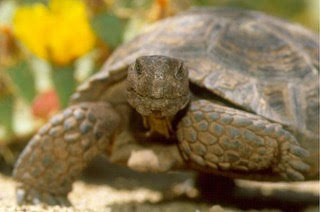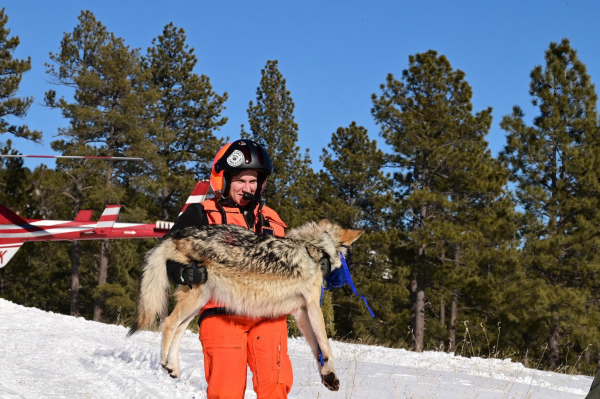Arizona: 200 Captive Desert Tortoises Need Forever Homes

Contact:
John Trierweiler, Public Information Officer
623-236-7230, jtrierweiler@azgfd.gov
Prepare now to welcome home new pet
PHOENIX — For some, a dog or cat will do just fine. But for others who are considering adopting something truly unique to Arizona, say hello to your next family member:
A Sonoran desert tortoise.
“Many people don’t even consider opening up their homes to desert tortoises, but they make fantastic and personable pets,” said Tegan Wolf, desert tortoise adoption program coordinator for the Arizona Game and Fish Department (AZGFD).
“It’s rewarding to hear stories from those who have adopted a captive tortoise and made them part of the family, because they’re a unique alternative to traditional family pets. They offer many of the same life lessons to children, and they can provide just as much companionship and personality as a dog or cat.”
Due primarily to illegal breeding, AZGFD has 200 tortoises of various ages and sizes available for adoption. Captive tortoises grow up to about 14 inches long and can live 80-100 years. They cannot be released back into the wild because they could spread diseases that harm wild populations.
Arizona residents interested in providing an adoptive home should review the Tortoise Adoption Program page on the department’s website. Instructions on how to properly care for a desert tortoise and how to build an enclosure/burrow are included.
Once the burrow is completed, potential adopters can submit an online application at www.azgfd.gov/tortoise. All applications will be reviewed, and applicants will be contacted by the department. Adopters must have a securely enclosed yard or construct a separate enclosure/burrow to prevent the tortoise from potential hazards, such as a fire pit, unfenced pool or dogs.
The enclosed area must include an appropriate shelter for the tortoise to escape Arizona’s extreme summer heat and a place to brumate — a seasonal period of inactivity similar to hibernation — during winter.
Watch a video on how to build a tortoise shelter
AZGFD allows for one tortoise to be adopted per person, per household, but an additional tortoise of the same sex can be adopted if it is placed in a completely separate enclosure, as these reptiles can be territorial. Federal law prohibits desert tortoises from being transported across state lines.
While it is illegal to remove Sonoran desert tortoises from the wild, it’s also illegal to allow them to breed in captivity. AZGFD and its partners must spend valuable resources and time each year to find homes for hundreds of captive tortoises.
“One female tortoise living to 80 years old can produce more than 800 babies in her lifetime,” Wolf said. “This is why it is crucial that we work together to ensure that tortoises are not only placed in proper homes, but with responsible owners.”
For more information about AZGFD’s Tortoise Adoption Program, or to provide a donation to help the department cover costs for tortoise food, shelter and medical expenses, visit www.azgfd.gov/tortoise. Or listen to the “Wild About Arizona” episode on desert tortoise adoption, the official podcast of AZGFD.
If you suspect someone is illegally breeding Sonoran desert tortoises, contact the department’s Operation Game Thief hotline 24/7 at 800-352-0700. Those submitting a tip can remain anonymous.
-30-
NOTE TO MEDIA
Contact John Trierweiler, public information officer, to arrange live or recorded interviews with staff. Tortoises will be made available. Reach Trierweiler at Jtrierweiler@azgfd.gov or 602-236-7230.
Download desert tortoise b-roll
Did you know?
The Arizona Game and Fish Department conserves and protects Arizona’s 800+ wildlife species but receives NO Arizona general fund tax dollars. Contribute to our on-the-ground conservation efforts at www.AzWildlifeHero.com.
The Arizona Game and Fish Department receives Federal assistance from the U.S. Fish and Wildlife Service, and thus prohibits discrimination on the basis of race, color, religion, national origin, disability, age and sex pursuant to Title VII of the Civil Rights Act of 1964, Title IX of the Education Amendments of 1972, the Age Discrimination Act of 1975, Section 504 of the Rehabilitation Act of 1973 and Title II of the Americans with Disabilities Act of 1990. To request an accommodation or informational material in an alternative format or to file a discrimination complaint please contact the Director’s Office at (623) 942-3000 or by mail at 5000 West Carefree Highway, Phoenix, AZ 85086. Discrimination complaints can also be filed with the U.S. Fish and Wildlife Service, Office of Diversity and Inclusive Workforce, Attention: Public Civil Rights and Disability Coordinator, 5275 Leesburg Pike, Falls Church, VA 22041.
Arizona Game & Fish Dept. · 5000 W. Carefree Hwy, Phoenix, AZ 85086






